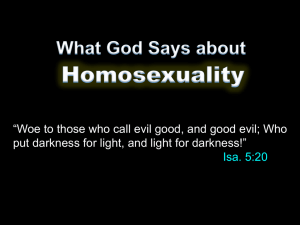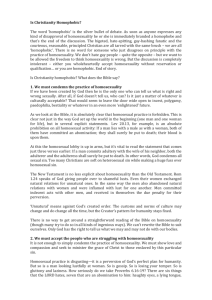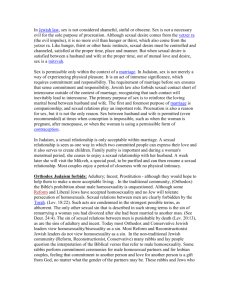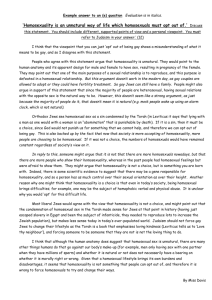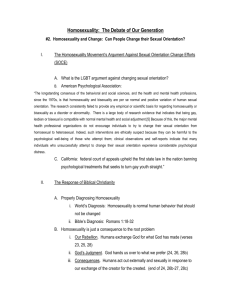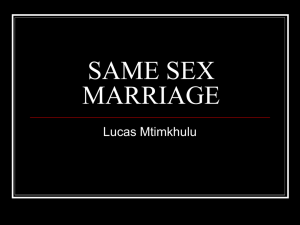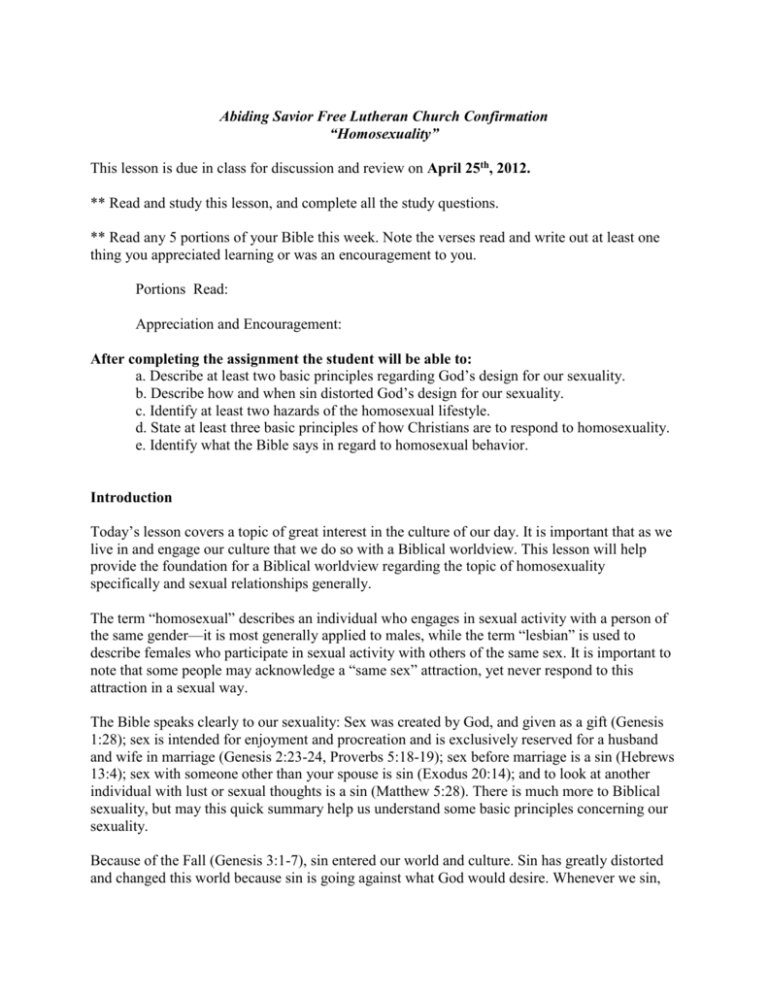
Abiding Savior Free Lutheran Church Confirmation
“Homosexuality”
This lesson is due in class for discussion and review on April 25th, 2012.
** Read and study this lesson, and complete all the study questions.
** Read any 5 portions of your Bible this week. Note the verses read and write out at least one
thing you appreciated learning or was an encouragement to you.
Portions Read:
Appreciation and Encouragement:
After completing the assignment the student will be able to:
a. Describe at least two basic principles regarding God’s design for our sexuality.
b. Describe how and when sin distorted God’s design for our sexuality.
c. Identify at least two hazards of the homosexual lifestyle.
d. State at least three basic principles of how Christians are to respond to homosexuality.
e. Identify what the Bible says in regard to homosexual behavior.
Introduction
Today’s lesson covers a topic of great interest in the culture of our day. It is important that as we
live in and engage our culture that we do so with a Biblical worldview. This lesson will help
provide the foundation for a Biblical worldview regarding the topic of homosexuality
specifically and sexual relationships generally.
The term “homosexual” describes an individual who engages in sexual activity with a person of
the same gender—it is most generally applied to males, while the term “lesbian” is used to
describe females who participate in sexual activity with others of the same sex. It is important to
note that some people may acknowledge a “same sex” attraction, yet never respond to this
attraction in a sexual way.
The Bible speaks clearly to our sexuality: Sex was created by God, and given as a gift (Genesis
1:28); sex is intended for enjoyment and procreation and is exclusively reserved for a husband
and wife in marriage (Genesis 2:23-24, Proverbs 5:18-19); sex before marriage is a sin (Hebrews
13:4); sex with someone other than your spouse is sin (Exodus 20:14); and to look at another
individual with lust or sexual thoughts is a sin (Matthew 5:28). There is much more to Biblical
sexuality, but may this quick summary help us understand some basic principles concerning our
sexuality.
Because of the Fall (Genesis 3:1-7), sin entered our world and culture. Sin has greatly distorted
and changed this world because sin is going against what God would desire. Whenever we sin,
we fall short of God’s plan—God’s plan being perfect is the absolute best for us; yet, as we sin,
we come to find ourselves experiencing much less than God’s best, and very often find ourselves
facing consequences for moving away from God’s will for us. This has happened especially in
our sexuality. In no area has sin likely caused more damage and distortion than in God’s design
for sex. Pornography, homosexuality, gay marriage, and sexual slavery (and many others) are the
results of this distortion.
In our culture today, homosexuality has become a main focal point. Let us turn our discussion to
this topic and see what a Biblical worldview on homosexuality looks like.
What does the Bible say about homosexuality? Read the following passages and note the
Bible’s view. What does God say about this act, in both the Old and New Testaments?
Genesis 19:4-7
Leviticus 18:22, 20:13
1 Timothy 1:8-10
1 Corinthians 6:9-10
Romans 1:25-27
Nowhere in the Bible is there an approval or acceptance of homosexual behavior. It is not an
“alternative life-style”, and in fact, is judged as sin in the Bible. But it is also important to note
that homosexuality is not called the greatest of all sexual sins, nor is it the “unforgiveable sin”.
As you would read through Leviticus 18, a chapter detailing sinful sexual relations, you will see
that homosexuality is sin, but not singled out as the ‘worst’ sexual sin.
Some young people worry unnecessarily about homosexual tendencies or feelings they suspect in
themselves. Often as a young person there is a deep attraction and friendship between someone
of the same sex, and a natural uneasiness or awkwardness around members of the opposite sex.
You may experience rejection by people of the opposite sex, but acceptance with those of the
same sex. It is very likely that as you mature, you will find an increasing attraction to members
of the opposite sex (God’s design for sexual attraction), as well as a greater peace in your
relations with members of the opposite sex. If a constant sexual interest in members of the same
sex continues, it is best to visit with your pastor or another adult about these feelings.
What does our culture say about homosexuality?
Much of the following material was adapted from The Family Research Council’s brochure
entitled “The Top Ten Myths of About Homosexuality.”
1. People are born gay…
This is simply untrue. Research past and present does not suggest anyone is ‘born gay’, and in
fact, research has indicated a broad and complex mix of developmental factors (environmental,
psychological, and interpersonal) that play into the cause of homosexuality. These studies reveal
that we can emphatically state that there is NO single cause for homosexuality, particularly one
of genetic makeup such as a ‘gay gene’. An Australian study concluded in 1991 studied 27 sets
of identical twin males, in which one of the twins was homosexual. In only 3 of these pairs was
the other twin identified as homosexual. Other like studies show even less of an occurrence in
twin children.
2. Our sexual orientation can never change…
This view would condone or accept any sexual behavior under the reasoning that “that is the way
I am”. This too is a false perspective. We have countless examples of men and women who have
experienced a change in their sexual orientation and attraction from homosexuality to
heterosexuality. Research has indicated that in some people a same sex attraction may occur,
even if it is not as a “choice”. Yet, homosexual conduct is always a choice, and one that can be
changed. The Gospel of Jesus Christ pronounces a freedom and victory over all sin (John 8:36, 1
Corinthians 6:9-11), and in light of this truth, all can be freed from the bondage of any sin. The
sin is not to be tempted, but rather, to give in to the temptation and act upon its urge.
3. 10% of the population is gay…
This statement is an untruth promoted by homosexual rights groups in our nation. A recent study,
the National Health and Social Life Study (1994), found that 2.8% of the male and 1.4% of the
female population identify themselves as gay, lesbian, or bisexual. This is the nation’s most
widely accepted and respected study of this nature.
4. Homosexuals do not experience higher levels of psychological disorders or physical
problems than those who are heterosexual…
Again, an untruth; research shows higher rates and risks of multiple illicit drug use, depression,
domestic violence, sexual abuse, mental health problems, alcohol abuse, anxiety, suicide, and
self-harm amongst homosexuals. The most obvious physical danger is STD’s (sexually
transmitted disease), which include HIV/AIDS. In fact, through 2007, 274,184 American men
had died of AIDS whose only risk factor was sexual relations with another man.
5. Homosexual relationships are identical to opposite sex ones except for the gender of the
partners, and children raised in a homosexual home are no different than those raised by
opposite sex parents.
Studies reveal that homosexual relationships are far less likely to be committed and faithful to
one partner. A 2005 study showed that 40-49% of homosexual men surveyed had determined
that sex outside of the relationship they were in was ok. Research clearly shows that children do
best physically and emotionally when raised by their own married mother and father. Studies
have shown repeatedly that the best environment for children to be reared and raised in is a home
with a biological mother and father, committed to one another in a one man-one woman marriage
relationship—just as God designed! Studies have shown that children raised in homosexual
homes are far more likely to suffer academically and socially, as well as engage in immoral
behaviors.
How are we to respond?
Let us remember that Jesus loved sinners and those who were tempted to sin. We must have
compassion for all who struggle with sin and temptation; yet, compassion and love differ from
approval and agreement. We do not react in violence or hatred, either in thought, word, or deed.
We are called to ‘hate the sin, but love the sinner.’ We offer to homosexuals, and to all who sin,
the forgiveness and freedom that only Jesus Christ provides. We must be careful not to hold up
homosexuality as the worst of all sins, and yet must acknowledge that all sin is serious in the
eyes of a holy God. God’s design for human sexuality is that of the marriage relationship, one
man and one woman, committed and faithful to one another until death parts them.
For further discussion…
Do you know someone who identifies themselves as a homosexual or lesbian? How do you
treat them? How are they treated by others?
What did you learn from this lesson that you did not know before?
If someone asked you if homosexuality was “ok”, how would you respond?
Describe God’s design for human sexuality. Why did God create sex?

